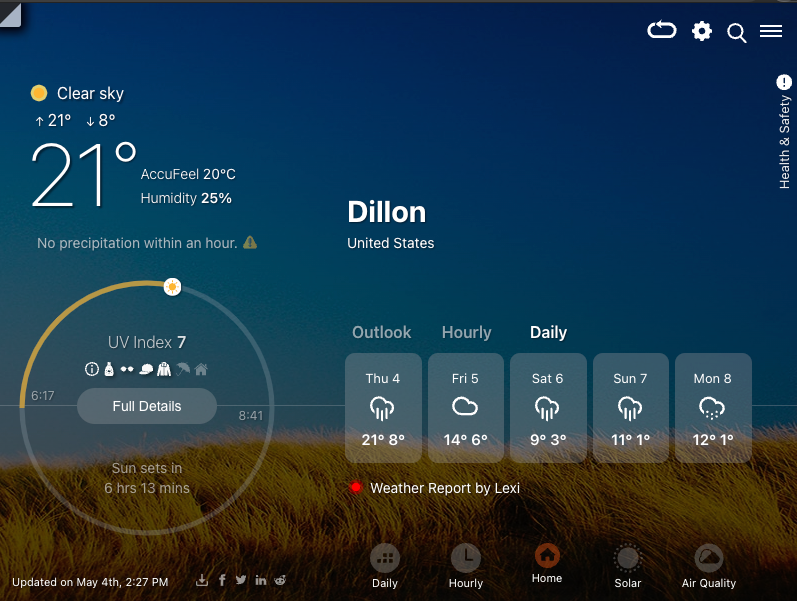3 min read . May 15, 2023
Weather forecasting has come a long way since the days of observing clouds and relying on folklore. With advancements in technology, meteorologists can now predict weather patterns with greater accuracy than ever before. Enter ChatGPT, an AI language model developed by OpenAI that is poised to revolutionize weather forecasting.
ChatGPT is perfect for handling large data sets due to its human-like text understanding and generation capabilities. By analyzing historical weather patterns, current conditions, and future predictions, this AI-powered system excels. It provides more accurate forecasts than traditional methods.
Moreover, ChatGPT’s natural language processing capabilities enable it to communicate complex weather information in a clear and concise manner. Forecasts will be more accurate and easier for the general public to understand.
As climate change continues to impact our planet, having access to reliable and accurate weather forecasts is becoming increasingly important. With ChatGPT at the helm, we can expect a future where predicting extreme weather events becomes more precise – helping us better prepare for what Mother Nature has in store.
Weather ChatGPT Predictions: The New Norm?
The use of artificial intelligence (AI) in various industries is no longer a novelty; it’s quickly becoming the norm. In meteorology, AI-powered predictions are proving their worth by providing more accurate forecasts than ever before.
One example of this is IBM’s GRAF (Global High-Resolution Atmospheric Forecasting) system. Launched in 2019, GRAF uses machine learning algorithms to analyze data from millions of sources worldwide. This includes satellites, weather stations, and smartphones, resulting in detailed hourly forecasts.
Similarly, Google’s DeepMind has developed an AI system capable of predicting rainfall up to six hours in advance with remarkable accuracy. By analyzing radar data, the system can generate high-resolution forecasts that help meteorologists make more informed decisions.
As AI-powered predictions become more commonplace, we can expect a future where weather forecasts are not only more accurate but also tailored to individual needs. Imagine receiving personalized weather updates based on your location and daily activities – all thanks to the power of AI.
How Weather ChatGPT Enhances Meteorology
ChatGPT’s potential impact on meteorology goes beyond simply providing more accurate forecasts. Its natural language processing capabilities can also enhance various aspects of the field, including:
1. Data analysis: ChatGPT can quickly process vast amounts of data from multiple sources, identifying patterns and trends that may be difficult for human meteorologists to spot.
2. Communication: By generating clear and concise text, ChatGPT can help meteorologists communicate complex weather information to the public in an easily digestible format.
3. Research: ChatGPT’s ability to analyze large datasets makes it a valuable tool for researchers studying climate change and other weather-related phenomena.
4. Education: With its natural language processing capabilities, ChatGPT could be used to create engaging educational materials that teach students about meteorology and related topics.
5. Decision-making support: ChatGPT aids government agencies and businesses by delivering precise weather forecasts, enabling informed decisions on emergencies.
Accurate Forecasts: Saving Lives
The importance of accurate weather forecasting cannot be overstated – especially when it comes to saving lives during extreme weather events. According to the World Meteorological Organization (WMO), improved early warning systems have helped reduce global disaster mortality by 50% over the past two decades.
AI-powered systems like ChatGPT improve our ability to predict severe weather events. This leads to increased accuracy and earlier warnings for hurricanes, tornadoes, floods, and heatwaves.
During Hurricane Harvey in 2017, AI-based models predicted the storm’s path and intensity more accurately. This surpassed traditional forecasting methods. This allowed emergency responders to better prepare for the disaster, ultimately saving lives and reducing property damage.
ChatGPT and other AI-powered systems are going to revolutionize weather forecasting by providing more accurate predictions, enhancing communication, and supporting decision-making processes. As we continue to face the challenges of climate change and extreme weather events, embracing these technological advancements will be crucial in our efforts to protect lives and property.

UV Weather powered by ChatGPT 4 | Lexi, Personal AI weather assistant
If you’re interested in trying out the future of weather reporting with ChatGPT, you can download the UV Weather Chrome extension. UV Weather is an extension that offers real-time weather updates, personalized predictions, and engaging news-style reports, powered by ChatGPT. It provides improved planning and a thorough comprehension of the weather. Whether you need information about tomorrow’s weather or you need to plan for the future.

